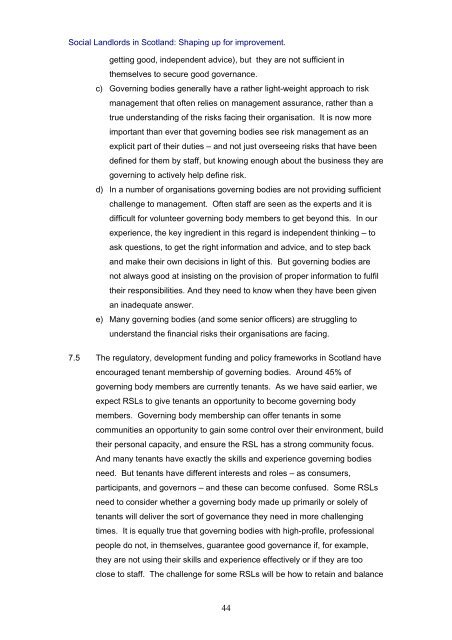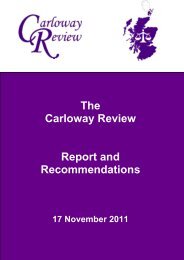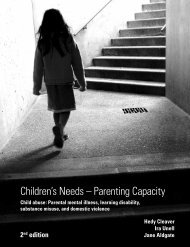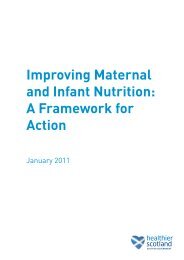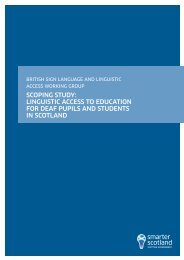Social Landlords in Scotland: Shaping up for improvement
Social Landlords in Scotland: Shaping up for improvement
Social Landlords in Scotland: Shaping up for improvement
Create successful ePaper yourself
Turn your PDF publications into a flip-book with our unique Google optimized e-Paper software.
<strong>Social</strong> <strong>Landlords</strong> <strong>in</strong> <strong>Scotland</strong>: Shap<strong>in</strong>g <strong>up</strong> <strong>for</strong> <strong>improvement</strong>.gett<strong>in</strong>g good, <strong>in</strong>dependent advice), but they are not sufficient <strong>in</strong>themselves to secure good governance.c) Govern<strong>in</strong>g bodies generally have a rather light-weight approach to riskmanagement that often relies on management assurance, rather than atrue understand<strong>in</strong>g of the risks fac<strong>in</strong>g their organisation. It is now moreimportant than ever that govern<strong>in</strong>g bodies see risk management as anexplicit part of their duties – and not just oversee<strong>in</strong>g risks that have beendef<strong>in</strong>ed <strong>for</strong> them by staff, but know<strong>in</strong>g enough about the bus<strong>in</strong>ess they aregovern<strong>in</strong>g to actively help def<strong>in</strong>e risk.d) In a number of organisations govern<strong>in</strong>g bodies are not provid<strong>in</strong>g sufficientchallenge to management. Often staff are seen as the experts and it isdifficult <strong>for</strong> volunteer govern<strong>in</strong>g body members to get beyond this. In ourexperience, the key <strong>in</strong>gredient <strong>in</strong> this regard is <strong>in</strong>dependent th<strong>in</strong>k<strong>in</strong>g – toask questions, to get the right <strong>in</strong><strong>for</strong>mation and advice, and to step backand make their own decisions <strong>in</strong> light of this. But govern<strong>in</strong>g bodies arenot always good at <strong>in</strong>sist<strong>in</strong>g on the provision of proper <strong>in</strong><strong>for</strong>mation to fulfiltheir responsibilities. And they need to know when they have been givenan <strong>in</strong>adequate answer.e) Many govern<strong>in</strong>g bodies (and some senior officers) are struggl<strong>in</strong>g tounderstand the f<strong>in</strong>ancial risks their organisations are fac<strong>in</strong>g.7.5 The regulatory, development fund<strong>in</strong>g and policy frameworks <strong>in</strong> <strong>Scotland</strong> haveencouraged tenant membership of govern<strong>in</strong>g bodies. Around 45% ofgovern<strong>in</strong>g body members are currently tenants. As we have said earlier, weexpect RSLs to give tenants an opportunity to become govern<strong>in</strong>g bodymembers. Govern<strong>in</strong>g body membership can offer tenants <strong>in</strong> somecommunities an opportunity to ga<strong>in</strong> some control over their environment, buildtheir personal capacity, and ensure the RSL has a strong community focus.And many tenants have exactly the skills and experience govern<strong>in</strong>g bodiesneed. But tenants have different <strong>in</strong>terests and roles – as consumers,participants, and governors – and these can become confused. Some RSLsneed to consider whether a govern<strong>in</strong>g body made <strong>up</strong> primarily or solely oftenants will deliver the sort of governance they need <strong>in</strong> more challeng<strong>in</strong>gtimes. It is equally true that govern<strong>in</strong>g bodies with high-profile, professionalpeople do not, <strong>in</strong> themselves, guarantee good governance if, <strong>for</strong> example,they are not us<strong>in</strong>g their skills and experience effectively or if they are tooclose to staff. The challenge <strong>for</strong> some RSLs will be how to reta<strong>in</strong> and balance44


